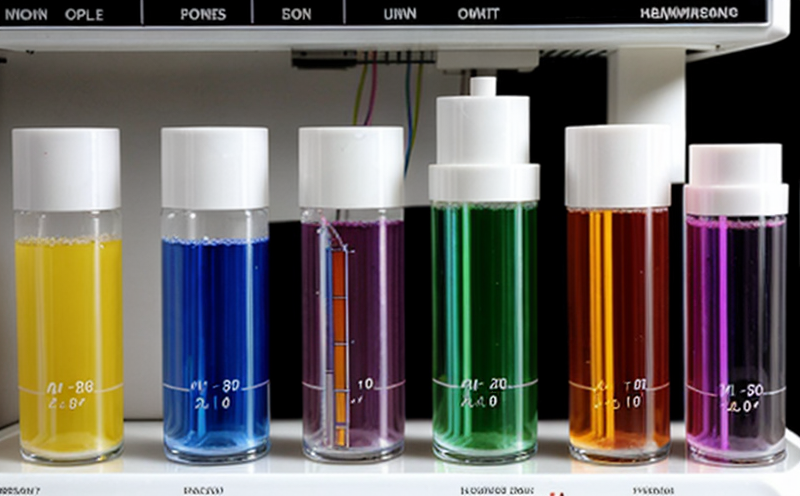ISO 17025 Laboratory Competence for Chromatographic Testing
The International Organization for Standardization (ISO) has developed ISO/IEC 17025:2017, a standard that sets the requirements for competence of bodies operating testing and calibration laboratories. The ISO 17025 standard ensures that these laboratories can demonstrate their technical capability to perform tests or calibrations accurately, reliably, and consistently.
Chromatographic analysis is a critical method used in chemical testing across numerous sectors including pharmaceuticals, food and beverage, environmental science, and petrochemical industries. This service focuses on ensuring laboratories meet the stringent requirements of ISO 17025 for their chromatographic testing capabilities. By adhering to this standard, laboratories can enhance their reputation and trustworthiness among clients.
The process involves rigorous calibration checks, method validation, proficiency testing, and personnel training. Chromatography encompasses various techniques such as Gas Chromatography (GC), Liquid Chromatography (LC), and High-Performance Liquid Chromatography (HPLC). Each technique has its unique applications in identifying components within complex mixtures.
For instance, Gas Chromatography-Mass Spectrometry (GC-MS) is widely used for the identification of volatile organic compounds. Conversely, HPLC finds extensive use in pharmaceutical research for assessing drug purity and impurities. Meeting ISO 17025 standards ensures that all these methods are executed with precision.
The requirements set by ISO/IEC 17025:2017 include having qualified personnel, state-of-the-art equipment, robust quality management systems, and continuous improvement practices. This ensures not only the accuracy of analytical results but also their reproducibility over time. Laboratories must undergo periodic audits and accreditation to maintain compliance.
By ensuring adherence to this standard, laboratories can provide clients with confidence that they are receiving reliable analytical data which is essential for making informed decisions in product development or regulatory compliance activities. The service offered here ensures your laboratory meets these stringent criteria thereby enhancing its credibility within the industry.
Benefits of ISO 17025 Laboratory Competence for Chromatographic Testing
- Enhanced Reputation: Demonstrates commitment to quality and reliability, boosting your lab’s reputation among clients and stakeholders.
- Regulatory Compliance: Ensures full compliance with national and international standards relevant to chromatography and other chemical testing methods.
- Increase Client Confidence: Clients can trust the accuracy and consistency of results produced by your laboratory.
- Promotes Continuous Improvement: Encourages ongoing training and development for staff, ensuring that they remain up-to-date with industry best practices.
- Supports Regulatory Requirements: Helps in meeting regulatory requirements set forth by various governing bodies like FDA or EU directives.
- Reduces Risk: Minimizes the risk of errors and inconsistencies in testing, leading to more accurate results.
The implementation of ISO 17025 accreditation provides a comprehensive framework for ensuring that your laboratory remains at the forefront of analytical technology and methodology. This not only enhances operational efficiency but also fosters innovation within your organization.
Industry Applications
| Industry Sector | Description of Application |
|---|---|
| Pharmaceuticals | Validation of drug compounds, identification of impurities, and compliance with regulatory standards. |
| Food & Beverage | Detection of contaminants, allergens, and other harmful substances in food products. |
| Petrochemical Industries | Analysis of crude oil composition, hydrocarbon analysis, and monitoring of refining processes. |
| Environmental Science | Evaluation of water quality parameters, air pollutants, and soil contamination levels. |
The versatility of chromatographic techniques makes them indispensable across multiple industries. This service ensures that your laboratory is equipped to handle these diverse applications effectively while maintaining the highest standards of accuracy and reliability.
Quality and Reliability Assurance
- Proficiency Testing: Participating in proficiency testing programs where results are compared against peers to ensure consistency.
- Internal Audits: Conducting regular internal audits to identify areas for improvement within the laboratory processes.
- Personnel Training: Providing continuous training and certification of staff members on latest technologies and methodologies.
- Detailed Documentation: Maintaining comprehensive documentation of all procedures, results, and corrective actions taken during any deviation from standard practices.
- Equipment Calibration: Regularly calibrating instruments to ensure they meet the required precision levels as per industry standards like ISO 17025:2017.
These measures are crucial in maintaining high levels of quality and reliability, which are essential for accurate analytical results. Continuous monitoring and improvement contribute significantly towards establishing a culture of excellence within your laboratory environment.





